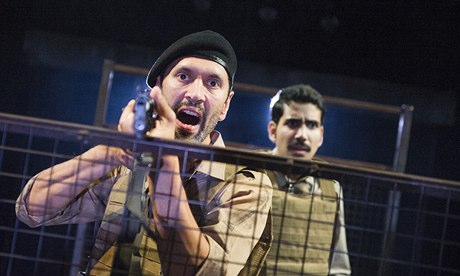Coming from an Islamic background, I was intrigued to see
how Abhishek Majumdar – a rising Indian playwright – would portray the Islamic
legend of the djinn as well as the political rivalry between India and
Pakistan. Coming from a theatre background, I was really intrigued to see how it
would unfold in front of a Western audience. Whilst The Djinns of Eidgah fails
due to a lack authenticity and clarity, it does a good job of educating and
informing and is worthy of its place at the Royal Court.
 |
| taken from guardian.co.uk |
The story follows the journey of Kashmiri siblings Ashrafi
and Bilal, whom are struck in the middle of political violence between Hindu and Muslims in the Kashmir area. Ashrafi’s mental
state means that she often falls into a world where she communicates – or
thinks she does – with the djinns of those that have passed her in life. Bilal
has a dream of becoming a hugely famous footballer but is held back by his
sister’s condition as well as his political agenda. Dr Baig is Ashrafi’s
psychiatrist and is an adamant, arrogant and absorbing character to say the least;
his son died fighting in the violence and it’s a fact that he’s not quite ready
to acknowledge or accept. In amidst the action, two Indian police officers
offer a unique perspective to the violence. Are you confused? I was.
By the end however, Majumdar has done enough for the
audience to engage with the action and sympathise with the characters. The
large scale of the on-going Kashmiri conflict affects every single character in
the piece and they all chase some form of freedom throughout the story. Tom
Scutt’s design creates a real sense of claustrophobia at the Jerwood Upstairs;
jumping from spiritual sequences to Kashmir ones in a very simple and
constructed manner. The stars of the show are the Indian police officers,
played by Jaz Deol and Paul Bazely, whom provide light relief [initially] to an
otherwise seriously written piece. Director Richard Twyman handles t
he subjects
well and his actors portray their characters with great sincerity. The entire
cast were equally as powerful and I could not pick a fault in any of their
acts. Danny Ashok (Bilal), Ameet Chana (Mushtaq) and Raj Bajaj (Khaled) work
great with one another. Their invisible football sequence was clever and well
performed.
 |
| taken from standard.co.uk |
The play ought to have remained consistent with its Islamic
references and originality. During the dream sequence in Dr Baig’s head,
Ashrafi should not be coming out to pray in the same room as three men;
whenever the actors mention the name of Allah, they should be following up with
“Subhana wa’tala”’; why is Bilal – a young Pakistani boy – dreaming of football
and not cricket? Maybe my cultural background has had an effect here but I
could clearly tell that this play has been written specifically for a Western
audience. That being said, the recital of Surah Fatihah was spot on and it created
a hauntingly eerie effect. The fact that some of the accounts were actual
stories from a psychiatric ward in Srinigar is exciting. I wonder if there were
enough accounts for a completely Verbatim approach here.
Michael Billington – sat next to me and fully focussed –
admitted to not being to grasp all of the action in The Djinns of Eidgah and I
would have to agree with him. However, a great cast on a smartly lit and
designed stage work wonders in this piece. Grab yourself a £10 Monday ticket (http://www.royalcourttheatre.com/whats-on/the-djinns-of-eidgah) because every other performance has sold out
in style.
£££

No comments:
Post a Comment